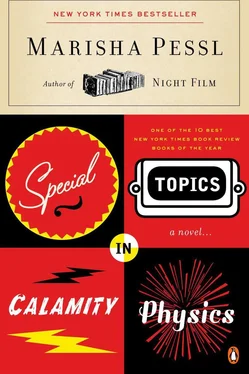“Again,” I shouted.
“I see Hannah.”
He grabbed my hand and yanked me through two Elvises.
“So where’d you come from?” asked Elvis: Aloha from Hawaii . “Reno,” said a very sweaty Elvis on Tour drinking from a blue plastic cup.
“She went upstairs,” Nigel said into my ear, trying to get us past Sodom and Gomorrah, Leopold and Loeb, Tarzan and Jane, who’d just managed to find each other in this jungle and were talking with a great deal of clothing fiddling. I didn’t know why Nigel wanted to find Hannah, but midway up, I saw only a six-ton Tyrannosaurus Ex who’d unzipped his costume and sat down on his rubber head.
“Fuck.”
“Why do you want to find her?” I shouted, “I thought the—” and just as I turned to look out over the bobbing wigs and masks, I saw her.
Her face was eclipsed by the brim of a top hat (only a white sliver of chin and red mouth was visible) but I knew it was she, due to the oil and vinegar reaction her presence had with all backdrops, atmospheres and given conditions. The young, the old, the pretty and plain merged to compose some standard room of talking people, but Hannah was permanently separate and distinctive, as if there were always an unmistakable, thin black line drawn around her, or a YOU ARE HERE arrow discreetly floated in her wake reading, SHE IS HERE. Or perhaps, due to a certain relationship she had with incandescence, her face exerted a gravitational pull on 50 percent of all the light in the room.
She was dressed in a tuxedo and heading our way, leading a man up the stairs. She held his left hand as if it were expensive, something she couldn’t afford to lose.
Nigel saw her too. “Who’s she dressed as?”
“Marlene Dietrich, Morocco , 1930. We need to hide.”
But Nigel shook his head and held on to my wrist. As we were trapped by a sheikh waiting for someone to come out of the upstairs bathroom and a group of men dressed as tourists (Polaroids, Hawaiian shirts) I could do nothing but brace myself for what was coming.
I was marginally reassured, however, when I saw the man. If she’d been with Doc three weeks ago, at least she’d traded up and was now arm in arm with Big Daddy (see The Great Patriarchs of American Theatre:1821–1990 , Park, 1992). Though he was gray haired, overweight in that Montgomery, Alabama way (when the stomach looked like a great big bag of loot and the rest of the body ignored that rude, uncouth section, going about its business of being perfectly fit and trim), something about him was satisfying, impressive. Dressed in a Red Army uniform (presumably as Mao Zedong), he had a chancellor’s posture, and his face, if not flat-out handsome, was at the very least splendid: rich, glistening and rosy, like a block of salted ham at a state dinner. It was also evident he was a little bit in love with her. Dad said being in love had nothing to do with words, action or the heart (“the most overrated of organs”), but with the eyes (“Everything essential concerns the eyes.”) and this man’s eyes couldn’t stop slipping and sliding off every curve of her face.
I wondered what she could possibly be saying to him, her profile puzzling into the space between his jaw and shoulder. Maybe she was wowing him with an ability to recite pi out to sixty-five decimal places, which I secretly thought would be sort of electrifying if some kid heatedly whispered it into my ear (“3.14159265…”). Or maybe she was repeating a Shakespearean sonnet, #116, Dad’s favorite (“If there are authentic words of love that exist in this English language, these are the ones people with any real affection should say, rather than the shopworn, ‘I love you,’ which can be uttered by any hebetudinous Tom, Dick or Moe”): “Let me not to the marriage of true minds admit impediments…”
Whatever it was, the man was mesmerized. He looked as if he couldn’t wait for her to garnish him with fresh bay leaves, slice him, pour him all over with gravy.
They were three stairs away now, passing the cheerleader, the woman dressed as Liza Minnelli leaning against the wall with makeup clogging her eyes like rotten leaves in old gutters.
And then she saw us.
There was a skid of her eyes, a brief suspension of smile, a catch, a soft sweater snagging a tree branch. All Nigel and I could do was stand with lousy smiles safety-pinned to our faces like HELLO MY NAME IS name tags. She didn’t say anything until she was next to us.
“Shame on you,” she said.
“Hi,” said Nigel brightly, as if he thought she’d said, “Overjoyed to see you,” and to my horror, he was now extending his hand to the man, who’d turned his large, soggy face curiously in our direction. “I’m Nigel Creech.”
The man raised one white eyebrow and tilted his head, smiling good-naturedly. “Smoke,” he said. His eyes were a crisp seersucker blue, and shrewd — surprisingly so. Dad said you could tell how sharp someone was by the tempo of his/her eyes on your face when you were introduced. If they barely did the box step or took to being wallflowers somewhere between your eyebrows, the person had “the IQ of caribou,” but if they waltzed from your eyes to your shoes, not nervously, but with easy, untroubled curiosity, then the person had “a respectable acumen.” Well, Smoke’s eyes macumbaed from Nigel to me back to Nigel and I felt in that simple movement he grasped every embarrassment of our lives. I couldn’t help but like him. Laugh lines parenthesized his mouth.
“You’re visiting for the weekend?” Nigel asked.
Smoke glanced at Hannah before he answered. “Yes. Hannah’s been kind enough to show me around.”
“Where are you from?”
Nigel’s aggressive curiosity wasn’t lost on Smoke. Again, he looked at Hannah. “West Virginia,” he said.
And then it was horrifying because Hannah didn’t say a word. I could see she was angry: redness soaked her cheeks, her forehead. She smiled, somewhat shyly, and then (and I noticed this because I was one step up from Nigel and could see her entirely, her too-long cuff and sleeve, the cane in her hand) she squeezed, tightly, Smoke’s bicep. This seemed to be a signal of sorts, because he smiled again, and said in his bear-hug voice: “Well, nice meeting you. So long.”
They continued on, passing the sheikh and the tourists (“Not many people realize the electric chair’s not a bad way to go,” shouted one) and some private dancer, a dancer for money in a tiny silver dress and white go-go boots.
At the top of the stairs, they turned down the hall, out of sight.
“Shit,” said Nigel, grinning.
“What’s the matter with you?” I asked. I wanted to slap the smile off his face.
“What?”
“How could you do that?”
He shrugged. “I wanted to know who her boyfriend was. Could have been Valerio.”
Doc do-si-doed into my head. “I’m not sure Valerio exists.”
“Well, you, doll face, may be an atheist but I’m a believer. Let’s get some air,” he said, and then he grabbed my hand and yanked me down the stairs after him, stepping around Tarzan and Jane (Jane pressed against the wall, Tarzan leaning way in) and outside onto the patio.
Jade and the others had joined the crowd by now, which hadn’t thinned, but buzzed like a porch wasp nest after a housewife stabs it with a broom. Leulah and Jade shared a deck chair talking to two men who wore their swollen, fleshy masks as hats. (They depicted Ronald Reagan, Donald Trump, Clark Gable, or any renowned man over fifty with formidable ears.) I didn’t see Milton (Black could come and go like stormy weather) but Charles was by the barbecue flirting with a woman in a lioness costume who’d pulled her mane down around her neck and casually stroked it every time Charles said something. Abraham Lincoln threw himself against a jackrabbit, banging into the picnic table so a platter of wilted lettuce fireworked into the air. Rock music screamed from speakers rigged by the hanging plants, and the electric guitar, the roars of the singer, so many shrieks and laughs, the moon, a sickle stabbing the pine trees off to the right — it all fused into a strange suffocating violence. Maybe it was because I was a little drunk and my thoughts moved slowly like blobs in a lava lamp, but I felt it was a crowd that could attack, loot, rape, cause a “violent uprising that detonated like a bomb, and ended a day later with the whimper of a silk scarf pulled from the flabby neck of an old lady — as all rebellions do, if they arise purely from emotion and no forethought” (see “The Last of the Summer Whine: A Study of the Novgorod Rebellion, USSR, August 1965,” Van Meer, The SINE Review , Spring, 1985).
Читать дальше












